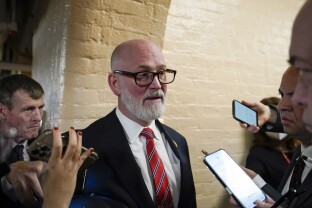As a Republican representing Wisconsin, Rep. Derrick Van Orden can’t afford his state losing much more of its agricultural workforce — but he can’t afford to walk out of step with his party on immigration, either.
“Rocks are heavy. Trees are made of wood. Gravity is real. There’s 20 million illegal aliens here that have been floating agriculture, hospitality and construction for decades, and we need their labor,” Van Orden told NOTUS.
That’s why he says he’s been working with Trump administration officials — specifically, Agriculture Secretary Brooke Rollins, Labor Secretary Lori Chavez-DeRemer and border czar Tom Homan — on a proposal to alter work authorization programs such as H-2A and H-2B, which allow foreign workers to fill temporary or seasonal jobs.
Van Orden, whose district is rated a Republican toss-up by The Cook Political Report, was quick to clarify that his bill would not offer them “a pathway to citizenship” or “any free pennies.” But he said it would make it easier for migrant workers to legally work in the U.S. while still discouraging illegal border crossings.
“That’s why people come here illegally, because it’s so hard to come here legally,” Van Orden said. “We’re all working towards the goal of making sure that our economy can maintain its relevancy.”
Making it easier for foreign laborers to work in the U.S. might not seem politically palatable with Trump’s mass deportation efforts in full swing. But Van Orden says that by encouraging people to leave the U.S. to qualify for the program, his proposal “will dovetail” with many of the administration’s — especially Trump’s plan to offer $1,000 to immigrants in the U.S. illegally who elect to leave the country.
“That works perfectly with our legislation, because our legislation includes a provision that you have to physically leave the country,” he said. “If you want to be an American citizen, the date you come back into the country is when you get in line for citizenship. You don’t skip ahead.”
Trump floated a similar idea to Van Orden’s bill at a cabinet meeting last month.
“If they go out in a nice way and go back to their country, we’re going to work with them right from the beginning on trying to get them back in legally,” Trump told administration officials. “We have to take care of our farmers and hotels and various places where they need the people.”
The Department of Labor, which helps administer the programs, did not respond to a request for comment, but the Department of Agriculture told NOTUS that it’s open to changes.
“President Trump is putting Farmers First and that includes strengthening the farm workforce and improving H2A and H2B visa programs. Our immigration system has been broken for decades, and we finally have a President who is enforcing the law and acting on fixing programs farmers and ranchers rely on to produce the safest and most productive food supply in the world,” a USDA spokesperson said in an emailed statement.
Van Orden’s office did not respond when NOTUS asked for more details about the legislation, but he briefly mentioned plans to put forth a proposal on a call with farmers in his district in February. Meanwhile, Trump administration officials, who routinely paint immigrants in the U.S. illegally as violent criminals, often with broad strokes, have signaled they’re at least open to streamlining the visa programs to protect certain industries’ workforces.
Though the Wisconsin congressman is willing to praise the administration’s deportation efforts, his immigration rhetoric stands out among some of his colleagues’.
“We also want to look at it from a humanitarian perspective. These folks have been here, and their only crime — and it is a crime that they committed, entering the country illegally — if that’s the only crime they’ve committed while they’re here, and they’ve been productively working to help our society, then we need to recognize that,” Van Orden said.
Van Orden said he’s wanted to see changes in these programs for a while. He joined other agriculture committee members on the bipartisan Agriculture Labor Working Group, which unanimously recommended 15 changes to improve those visa processes last year.
His state’s agricultural stakeholders also have a serious appetite for the visa programs to change, saying they’re expensive and require too much paperwork for farmers.
“A critical step in addressing labor shortages is modernizing immigration laws. It’s unrealistic to expect workers to enter legally when the current system is broken,” Tyler Wenzlaff, national affairs coordinator at the Wisconsin Farm Bureau Federation, told NOTUS in an email. “It is possible to enforce border security while also ensuring agriculture at a local level has the workforce it needs to thrive.”
Van Orden declined to share which other lawmakers have signed onto the effort so far, but said the bill, which is currently on its fourth version, should be ready by “next week, maybe.”
One Wisconsin lawmaker who is not working with Van Orden on the bill is Sen. Ron Johnson, who said he thought worker shortages in some industries might better be resolved through other policy changes. Though he didn’t completely rule out his support of his colleague’s proposal, as long as it didn’t offer new citizenship pathways, which Johnson said would be “an incentive for more people coming illegally.”
“People who were basically welcomed to this country by the Biden administration, very unwisely, I want to treat those people with real humanity — the ones that aren’t committing crimes, that aren’t criminals, drug traffickers, that are working,” Johnson said. “We need to figure out how to do that.”
—
Emily Kennard is a NOTUS reporter and an Allbritton Journalism Institute fellow.
Sign in
Log into your free account with your email. Don’t have one?
Check your email for a one-time code.
We sent a 4-digit code to . Enter the pin to confirm your account.
New code will be available in 1:00
Let’s try this again.
We encountered an error with the passcode sent to . Please reenter your email.


